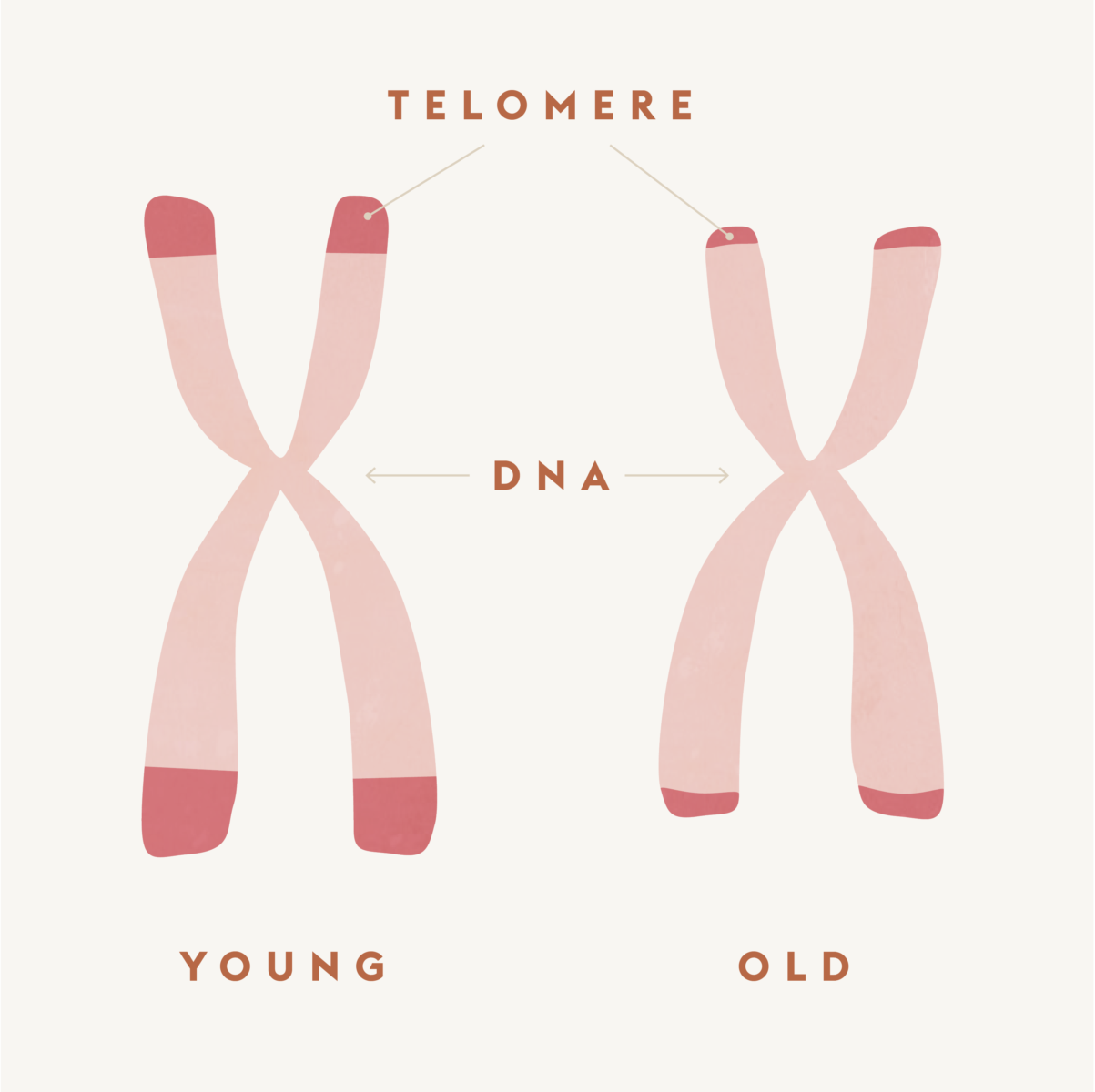Now, while telomeres naturally shorten as we age, research has found that there may be ways to slow down the telomere shortening process. Some studies have shown that lifestyle factors can play a large role in telomere shortening and because shorter telomeres have been associated with an increased risk of disease it’s in our best interest to figure out what lifestyle adjustments we can make to slow it down and therefore protect ourselves and our chromosomes for a little bit longer. Taking a deep dive, we look at what telomeres are, why they shorten with age, how to lengthen them and how to know if yours should be cause for concern.
What are telomeres?
Telomeres are a specific sequence of DNA that forms a cap at the two ends of each chromosome. This cap – like the plastic cap on the end of a shoelace – keeps the chromosome from fraying each time it’s replicated. When a cell divides, it replicates everything inside of it, including its chromosomes – the bundles of DNA that provide the genetic blueprint for building and running your body. Without telomeres to protect them, chromosomes get increasingly tangled and damaged, resulting in poorly constructed cells and speeding up the process that leads to cell death. This, in turn, means an older, less resilient body.

Research shows that longer telomeres are associated with a longer lifespan, and that shorter telomeres are associated with the diseases of aging: heart disease, cancer, and osteoporosis.
What causes telomere shortening?
Interestingly enough, telomeres themselves can be damaged in the aging process; the shorter telomeres get, the less protective they are to the chromosome. This is where telomerase comes in. Telomerase is an enzyme–a protein–whose job it is to repair the telomeres. Over time, telomerase can be depleted and degraded, making it harder for the body to repair its telomeres.
An important research paper in Nature, showed that mice genetically engineered without telomerase aged prematurely, but bounced back to health when telomerase was added back in. The mice literally got younger in real-time.
It turns out that we may have more control of our telomeres than we previously thought. Lifestyle is an important determinant of telomere length and telomerase function – this may explain how we age more, or less, than others through the choices we make every day.
5 ways to encourage telomere lengthening and delay shortening
1. Maintain a healthy weight.
Research has found obesity as an indicator of shorter telomeres. The loss of telomeres in obese individuals is the equivalent to 8.8 years of life, scientists say. A study investigating the relationship further found increased levels of oxdidative stress in obese mice, a process responsible for damaging DNA and therefore expediting telomere shortening.
2. Exercise regularly.
Research has shown that exercise can reduce oxidative stress and help preserve DNA. One study found that men in their 50s who were active runners had nearly the same telomere length as men in their 20s while men in their 50s who were sedentary had telomeres that were shorter by 40 percent. The sedentary men also looked remarkably older than their runner counterparts.
3. Manage chronic stress.
How stress causes telomere shortening is not yet fully understood, but people who face adversity early in life and those who are burdened by chronic caregiving, heavy workloads and financial stress, have shorter telomeres than others, controlling for age and lifestyle factors. To lower stress, we recommend meditation – it’s one of the most powerful ways to combat chronic mental stress.
4. Eat a telomere-protective diet.
Foods rich in antioxidants like vitamin C (red peppers, kale), anthocyanins (blueberries) and polyphenols (dark chocolate, cloves) – contribute to an overall positive antioxidant balance, protecting DNA from oxidative stress. One study found that a diet high in fruits, vegetables, whole grains, dairy products and plant-based protein and low in red and processed meats, sodium, and added sugars, were especially beneficial to healthy cellular aging in women. At Parsley Health, we recommend our patients follow a predominantly plant-based diet, ensuring they fill at least half their plate with plants to decrease inflammation, a breeding ground for oxidation and disease.
5. Incorporate supplements.
While there is no direct evidence that antioxidant supplements improve aging on their own, there is evidence that some supplements support the body’s natural anti-aging mechanisms by helping the body make its own antioxidants. In particular, N-acetyl-cysteine (NAC) supports the body’s production of one of the few and essential internal cellular antioxidants, Glutathione. That said, supplement quality is highly variable and choosing the right one is best done with the guidance of an expert.
Why isn’t there a telomere lengthening pill?
The answer is, the body is smarter than that. Just adding in telomerase may be dangerous, as cells that develop the ability to keep their telomeres intact forever are considered “immortal cells,” aka cancerous cells. While healthy cells naturally die off and regenerate, cancer cells tend to stick around and that’s when they start to cause trouble. Thus, there is a lot more we need to know before focusing on a quick-fix like supplementing telomerase.
How do I know if my telomeres are short? Telomere testing.
There are direct-to-consumer tests that will give you your ATL, average telomere length, and compare it to the averages of others in your age group.
Whether you do the telomere testing on your own or with a doctor, we encourage you to work with a knowledgeable physician who can help you understand what your telomere length means in the context of your personal risk factors and health story, and who can recommend a personalized program based on the results. After all, a test result is only as valuable as what you do with the information.







